How to Choose the dj moving head lights manufacturer and supplier in us?
- How to Choose the DJ Moving Head Lights Manufacturer and Supplier in the US
- Introduction — Why choosing the right dj moving head lights supplier matters
- About LQE — A proven OEM/ODM partner for stage lighting
- Understand buyer intent — What US buyers typically search for
- Types of moving head lights — Match fixture type to application
- Key technical specs to evaluate in dj moving head lights
- Certifications and compliance — Mandatory for US market access
- Quality control and manufacturing capability — What to verify
- Warranty, spare parts, and service network — Reduce operating risk
- Testing and performance metrics — Request measurable data
- Supply chain, lead times, and MOQ — Practical procurement concerns
- Pricing and total cost of ownership — Look beyond unit cost
- Customization (OEM/ODM) — When to choose private label or custom features
- After-sales support — Service level agreements to negotiate
- Supplier evaluation checklist — A compact comparison matrix
- Real-world buying scenarios — Which supplier model fits you?
- Red flags to watch for when selecting a manufacturer
- Why LQE can be a strategic partner for US buyers of dj moving head lights
- Conclusion — A pragmatic approach to selecting your dj moving head lights supplier
- Sources and further reading
- Call to action
- Frequently Asked Questions
How to Choose the DJ Moving Head Lights Manufacturer and Supplier in the US
Introduction — Why choosing the right dj moving head lights supplier matters
Choosing the right dj moving head lights manufacturer and supplier is a commercially critical decision for club owners, rental companies, touring productions, and retailers. Reliable fixtures reduce downtime, meet safety and compliance requirements for the US market, and deliver consistent visual results. This guide walks you through what to evaluate — technical specs, certifications, quality control, warranty, logistics, and supplier capabilities — so you can make a confident procurement decision.
About LQE — A proven OEM/ODM partner for stage lighting
LQE was founded in 2008 and is headquartered in Foshan, China. We are a professional OEM/ODM stage lighting equipment manufacturer specializing in the R&D, production, and sales of middle- and high-end digital stage lighting. Our production base covers about 10,000 square meters, with capacity to produce 100,000 fixtures annually and holding 80 national patents. LQE produces a wide range of moving head lights and static fixtures for theaters, concerts, studios, houses of worship, nightclubs, and theme parks. For US buyers looking for dependable DJ moving head lights, LQE offers scalable OEM/ODM services, compliance support, and long-term after-sales service.
Understand buyer intent — What US buyers typically search for
Most US buyers searching for dj moving head lights want: 1) reliable fixtures with specific output (beam/wash/spot), 2) US compliance and safety certifications (UL/ETL, RoHS), 3) warranty and spare parts, and 4) logistics and import support. Some buyers want private-label (OEM) fixtures or customized features (ODM). Knowing these intents helps you shortlist the right manufacturers and suppliers.
Types of moving head lights — Match fixture type to application
Choosing the right type of dj moving head lights is the first technical decision. There are three common types: Beam, Spot, and Wash. Each has different optical characteristics and power needs.
| Type | Typical Beam Angle | Typical Power (LED) | Best Use Case |
|---|---|---|---|
| Beam | 1°–4° | 150W–480W | Tight shafts of light for clubs, concerts |
| Spot | 3°–20° (zoomable) | 60W–300W | Gobo projection, sharp edges, theatrical highlights |
| Wash | 10°–60° (frost/zoom) | 60W–400W | Broad color washes for stages, DJ booths |
Key technical specs to evaluate in dj moving head lights
When comparing manufacturers, request clear, testable specifications. Important items include LED power and brand, beam angles, zoom range, CRI (if color fidelity matters), color system (CMY or color wheel), gobo options, pan/tilt range (commonly 540° pan and 270° tilt), DMX channels and protocols (DMX512, RDM, Art-Net, sACN), power consumption, cooling method, and IP rating for outdoor use (IP20 indoor, IP65 for outdoor-rated fixtures).
Certifications and compliance — Mandatory for US market access
For legal sale and safe operation in the US, ensure the supplier provides relevant certifications and test reports. Key certifications to look for: UL or ETL (safety listings for North America), FCC (EMC requirements), RoHS (hazardous substances), and CE for international trading. For outdoor fixtures, check IP ratings and, if applicable, NRTL test reports that validate compliance.
| Certification | Why it matters | Typical Supplier Deliverable |
|---|---|---|
| UL / ETL | Confirms electrical safety for US/Canada | Certificate or test report; sometimes required for venue insurance |
| FCC | Addresses electromagnetic interference | FCC declaration of conformity or report |
| RoHS | Limits hazardous substances in electronics | RoHS test report |
| IP Rating | Shows dust/water resistance for outdoor fixtures | IPxx rating declared in datasheet and test evidence |
Quality control and manufacturing capability — What to verify
Ask about the manufacturer's production capacity, quality management systems (ISO 9001), in-line and final QC procedures, burn-in testing duration (commonly 24–72 hours for LEDs), and failure rate statistics. LQE's production capability — approximately 100,000 fixtures annually and 80 national patents — signals scale and R&D investment. Verify sample reports, factory inspection photos, and third-party QC audits when possible.
Warranty, spare parts, and service network — Reduce operating risk
Warranty length and spare-parts availability are decisive for buyers. Typical warranties range from 2 to 5 years depending on product class. Confirm Mean Time Between Failures (MTBF) expectations, LED lifetime (commonly 50,000 hours for quality LED modules), and whether the supplier offers a North American service partner or parts shipping from local warehouses. For US customers, suppliers that support replacement parts stocked in the US shorten downtime.
Testing and performance metrics — Request measurable data
Good manufacturers will provide photometric data (lux at distance), lumen output, beam profile, power draw, and thermal behavior. Request IES files or lux charts for your intended throw distances and real-world usage. Insist on full electrical and photometric test reports for production units to avoid surprises on stage.
Supply chain, lead times, and MOQ — Practical procurement concerns
Understand factory lead times, minimum order quantities (MOQ) for OEM/ODM, and standard lead for stock items. Lead times will vary with customization; typical production lead times for custom fixtures are 8–14 weeks. For off-the-shelf models, expect 2–6 weeks depending on inventory. Also evaluate shipping options (LCL, FCL, air freight) and customs support for US import clearance.
Pricing and total cost of ownership — Look beyond unit cost
Unit price is only part of the picture. Consider total cost of ownership: initial purchase price, power consumption, lamp or LED replacement costs, maintenance, shipping, duties, and downtime risk. LED fixtures usually deliver energy savings and lower maintenance compared to discharge lamps; typical LED modules are rated around 50,000 hours, reducing long-term operating expense.
Customization (OEM/ODM) — When to choose private label or custom features
If you need custom housings, controls, firmware, or branding, choose a manufacturer with proven OEM/ODM experience. LQE provides OEM/ODM stage lighting capabilities and R&D experience suitable for private-label products while supporting compliance and documentation for US markets. Confirm development timelines, NRE (non-recurring engineering) costs, and IP agreements before starting.
After-sales support — Service level agreements to negotiate
Negotiate clear after-sales terms: response time for technical support, RMA process, spare-parts lead times, and whether the manufacturer will assist with field repairs. A transparent SLA reduces ambiguity and protects your business from prolonged outages.
Supplier evaluation checklist — A compact comparison matrix
| Criteria | What to Check | Good Benchmark / Example |
|---|---|---|
| Certifications | UL/ETL, FCC, RoHS, IP ratings | Provides test reports and NRTL markings |
| Capacity & QC | Factory size, burn-in, failure rates | ISO 9001, 24–72 hr burn-in |
| Warranty | Length, coverage, spare parts | 2–5 years, parts stocked regionally |
| Technical data | IES files, lux charts, power draw | Provides photometric data for verification |
| OEM/ODM | Customization capability, NRE costs | Proven design-to-production workflow |
| Logistics | Lead times, shipping, US stock options | Clear lead-time table and FOB/CIF options |
Real-world buying scenarios — Which supplier model fits you?
Different buyers will choose different supplier models: 1) Retailers or clubs often buy stock models from authorized distributors to get immediate service and US warranty support; 2) Rental companies and touring productions may buy directly from manufacturers for lower unit cost and spare parts packages; 3) Brands and large integrators frequently use OEM/ODM relationships to create private-label products. Match your business model to the supplier's strengths.
Red flags to watch for when selecting a manufacturer
Be cautious about suppliers that can't produce verifiable test reports, refuse factory visits or third-party audits, lack clear warranty terms, or have unclear lead times and MOQ. Also avoid vendors that cannot support required US certifications or who refuse reasonable sample runs before bulk orders.
Why LQE can be a strategic partner for US buyers of dj moving head lights
LQE combines production scale (10,000 m² factory, 100,000 fixtures/year capacity), R&D (80 patents), and OEM/ODM experience. For US buyers LQE can supply certified fixtures, customization, and documented QC processes. LQE’s focus on modern LED stage lighting and customer service aims to deliver high-quality, long-lasting solutions that meet venue and rental needs.
Conclusion — A pragmatic approach to selecting your dj moving head lights supplier
To choose the right dj moving head lights manufacturer and supplier in the US, prioritize verified certifications (UL/ETL/FCC/RoHS), detailed technical and photometric data, robust QC and warranty, and clear logistics and parts support. If you need OEM/ODM capabilities and production scale, consider established partners like LQE that combine R&D, capacity, and compliance support. Use the checklist and tables in this guide to compare suppliers objectively and reduce procurement risk.
Sources and further reading
- U.S. Department of Energy — General information on LED lifetime and energy savings
- USITT — DMX512 standard history and use in stage lighting
- Grand View Research — Stage and professional lighting market trends (industry reports)
- Manufacturers’ datasheets and industry standard technical references for moving head lights
Call to action
If you need help evaluating manufacturers, requesting sample test reports, or arranging OEM/ODM development for dj moving head lights, contact LQE for specification sheets, certification documents, and sample quotations tailored to your US market requirements.
Frequently Asked Questions
What certifications should DJ moving head lights have for safe sale and operation in the US?UL or ETL safety listing (or an NRTL mark), FCC EMC compliance, and RoHS for hazardous substances are commonly required. For outdoor fixtures, check IP ratings and any local venue insurance requirements.
What is the typical warranty and LED lifetime for quality moving head fixtures?Warranties commonly range from 2 to 5 years depending on product class. High-quality LED modules are typically rated around 50,000 hours—this varies by LED brand and usage conditions.
Should I buy from a US distributor or directly from a manufacturer in China?If you need fast regional service, buy from a US distributor with local stock and warranties. If you want lower unit cost, customization, or private-label OEM products, buy directly from an experienced manufacturer with US-market compliance support.
What is the difference between beam, spot, and wash moving head lights?Beam fixtures produce very narrow shafts of light for dramatic effects; spot fixtures have sharper edges and gobos for pattern projection; wash fixtures provide broad, even color coverage for stages and DJ setups.
Which control protocols should I expect in modern moving head lights?DMX512 is standard for most fixtures. Many modern fixtures also support RDM (remote device management), Art-Net, and sACN for networked lighting control.
How can I verify a manufacturer’s claims about photometrics and reliability?Request IES files, lux charts, burn-in reports, failure rate statistics, and third-party lab test reports. When possible, arrange a sample evaluation and factory audit or use a trusted third-party inspector.
How to Choose the floor stage lighting manufacturer and supplier in us?
Custom moving heads lighting Manufacturers and Suppliers
Top 5 spot moving head profile light factory Company List and Products Compared
Custom waterproof beam moving head light Manufacturers and Suppliers
Distributor
Can LQE help with product training and technical guidance?
Absolutely. We offer remote training sessions, user manuals, installation guides, and continuous technical support to help your team understand and sell our products with confidence.
What is your typical lead time for distributor orders?
Our standard production lead time is 15–30 working days depending on order volume and customization requirements. For stocked models or repeat orders, we can offer shorter delivery times.
1000w
What Kind of Certificates You Offer?
All kinds of certificates could be offered by LQE digital moving light factory, which depends on customer’s required, different pricing plan for different approval.
Does LQE Offer a Stage Light Design Solution?
LQE experienced team glad to supply a stage lighting configuration design solution or suggestion for projector who don’t have much experience in lighting design, project, theatre and studio.
Do You Supply After-Sale Service?
LQE lighting offers 7x24 hrs systematic SOP customer support with dedicated personnel, ensuring quick and comprehensive assistance for stage lighting needs.
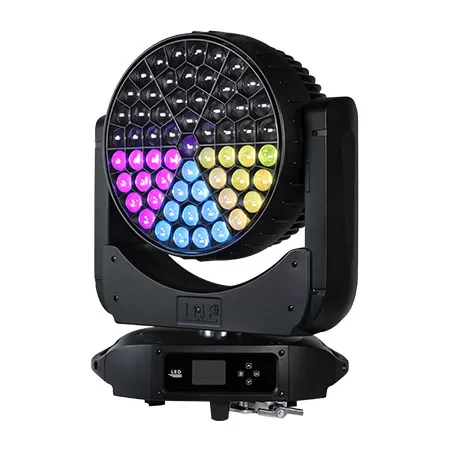
1000w 61x40w RGBW Stage Moving Head Wash Light LW1000
1000W 61x40W LED RGBW Mulichips Moving Head Wash Lights with Zoom (5°–50°), Covering Large Range and Long Distance. Designed to deliver a 5°–50° ultra-large zoom range to achieve a greater wash effect, illuminating stages and events with stunning lighting effects.
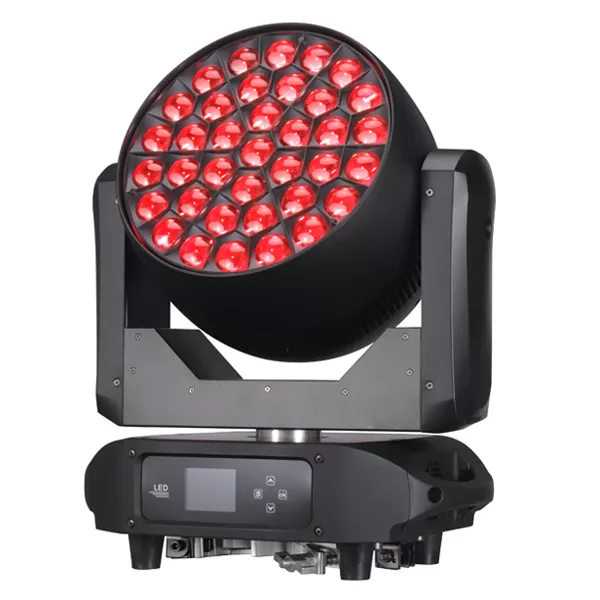
800w 37x40w RGBW Stage Moving Head Wash Light LW800
800W 37x40W LED RGBW Mulichips Moving Head Wash Lights with Zoom (5°-50°), Covering Large Range and Long Distance. Designed to deliver a 5°–50° ultra-large zoom range to achieve a greater wash effect, illuminating stages and events with stunning ring control lighting effects.
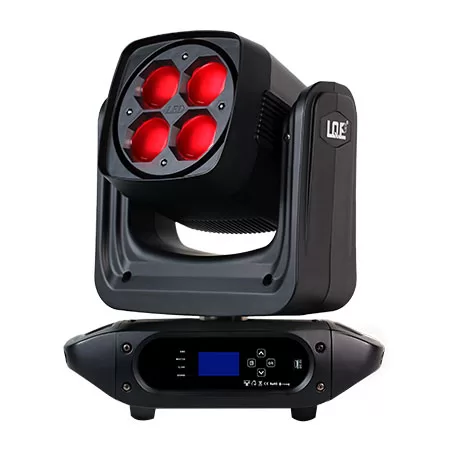
LED Moving Head Stage Wash Light LW200Z
The versatile moving head stage light provides a powerful lighting solution for theaters, concerts, and large outdoor performances. Suitable for theaters, TV stations, entertainment stages, and large outdoor performance scenes.
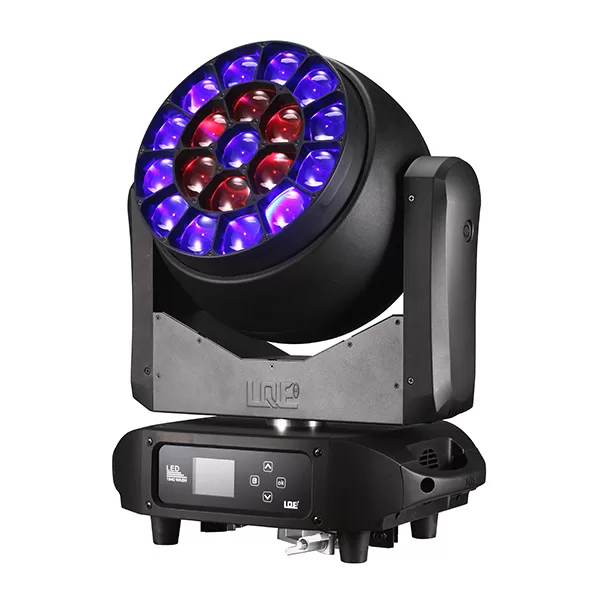
600w 19x40w RGBW Stage Moving Head Wash Light LW600 Zoom IP20
600W 19x40W LED RGBW Mulichips Moving Head Wash Lights with Zoom (5°–50°), Covering Large Range and Long Distance. IP20: Designed to deliver a 5°–50° ultra-large zoom range to achieve a greater wash effect, illuminating stages and events with stunning ring control lighting effects.

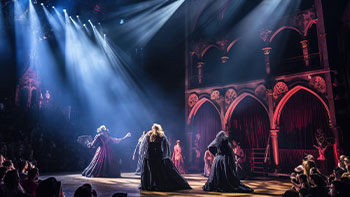
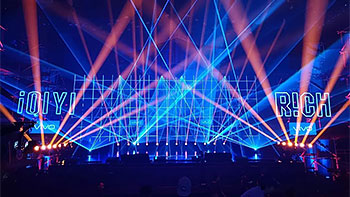
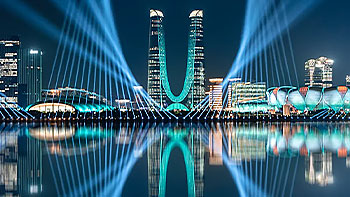
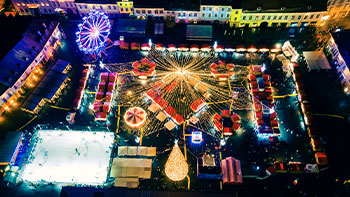
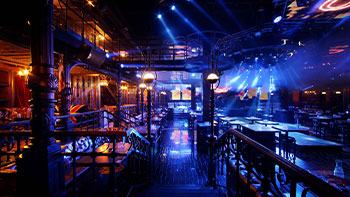
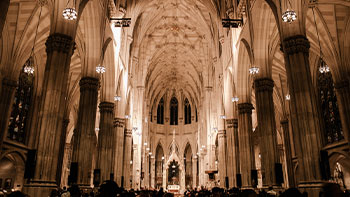






Linkedin
YouTube
Whatsapp: +8618924548390
TikTok